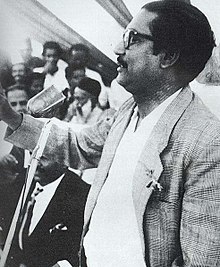
East Pakistan was the eastern provincial exclave of Pakistan between 1955 and 1971, covering the territory of the modern country Bangladesh. The province was restructured and renamed from East Bengal, which, in modern times, is split between India and Bangladesh. Its land borders were with India and Burma, with a coastline on the Bay of Bengal. East Pakistanis were popularly known as "Pakistani Bengalis"; to distinguish this region from India's state West Bengal, East Pakistan was known as "Pakistani Bengal". In 1971, East Pakistan became the newly independent state Bangladesh, which means "country of Bengal" or "country of Bengalis" in Bengali language.

Sheikh Mujibur Rahman, popularly known by the honorific prefix Bangabandhu was a Bangladeshi politician, revolutionary, statesman, activist and diarist. As a politician, Mujib had held continuous positions as president or prime minister from April 1971 until his assassination in August 1975: as president from 1971 to 1972 and briefly from 1975 until his death, and as prime minister from 1972 to 1975. Mujib successfully led the Bangladeshi independence movement and restored the Bengali sovereignty after over two centuries following the Battle of Plassey in 1757, for which he is honoured as the 'Father of the Nation' in Bangladesh. In 2011, the fifteenth constitutional amendment in Bangladesh referred to Sheikh Mujib as the Father of the Nation who declared independence; these references were enshrined in the fifth, sixth, and seventh schedules of the constitution. His Bengali nationalist ideology, socio-political theories, and political doctrines are sometimes called Mujibism.
Mohammad Mohammadullah was the third president of the People's Republic of Bangladesh. Mohammadullah became the Acting President on 24 December 1973, was elected president on 24 January 1974, and took oath of office on 27 January 1974. He remained President until 25 January 1975.
Independence of Bangladesh was declared on 26 March 1971, celebrated as Independence Day, from Pakistan. The Independence Day of Bangladesh is celebrated on 26 March when Sheikh Mujibur Rahman declared the independence of Bangladesh. The Bangladesh Liberation War started on 26 March and lasted till 16 December 1971 which is celebrated as Victory Day in Bangladesh. There is a dispute along partisan line on who declared the Independence of Bangladesh. The Awami League claim Sheikh Mujibur Rahman while the Bangladesh Nationalist Party claim it was Ziaur Rahman.

Tajuddin Ahmad was a Bangladeshi politician and statesman. He led the Provisional Government of Bangladesh as its prime minister during the Bangladesh Liberation War in 1971 and is regarded as one of the most instrumental figures in the birth of Bangladesh.
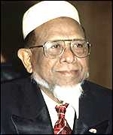
Abdus Samad Azad was a Bangladeshi diplomat and politician. He was elected to Bangladesh's parliament five times from 1970 to 2001. He was also elected Member of Lower Assembly in the Parliament of the then East Pakistan. He became President of the Muslim Student Federation of All - Asam in 1946 and led the Language Movement in 1952.

Kamal Hossain is a founding leader, lawyer and politician of Bangladesh. He is known as the "father of the Bangladeshi constitution" and regarded as an icon of secular democracy in the Indian subcontinent. Hossain currently heads his own law firm in Dhaka. He retired from political activities and from the post of president of Gano Forum in October 2023.

Rehman Sobhan is a Bangladeshi economist. Regarded as one of the country's top public thinkers, he is the founder of the Centre for Policy Dialogue. Sobhan is an icon of the Bangladeshi independence movement due to his role as a spokesman of the Provisional Government of Bangladesh in the United States during the Bangladesh Liberation War. He was awarded the Independence Day Award, Bangladesh's highest civilian honour, in 2008.
The Agartala Conspiracy Case was a sedition case in Pakistan during the rule of Ayub Khan against Awami League, brought by the government of Pakistan in 1968 against Sheikh Mujibur Rahman, the then leader of the Awami League and East Pakistan, and 34 other people.

Bengali nationalism is a form of nationalism that focuses on Bengalis as a singular nation. Bengalis speak the Bengali language and mostly live across Bangladesh and the Indian states of West Bengal, Tripura and Assam. Bengali nationalism is one of the four fundamental principles according to the Constitution of Bangladesh and was the main driving force behind the creation of the independent nation state of Bangladesh through the 1971 liberation war. Bengali Muslims make up the majority (90%) of Bangladesh's citizens (Bangladeshis), and are the largest minority in the Indian states of Assam (29%) and West Bengal (27%), whereas Bengali Hindus make up the majority (60%) of India's citizens (Indians) in Indian state of West Bengal, and are the largest minority in the Indian states of Assam (28%) and Jharkhand (8%) and the independent state of Bangladesh (8%).
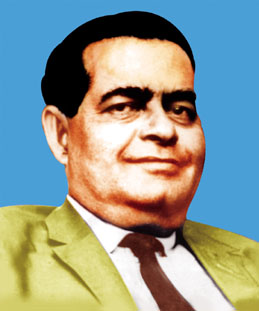
Tofazzal Hossain, popularly known as Manik Miah, was a Pakistani Bengali journalist and politician. He served as the founding editor of The Daily Ittefaq. He wrote the editorial Rajnoitik Moncho. Most of his journalists were considered leftist, as Miah followed the pattern of Awami League. According to journalist and editor of Shongbad Bozlur Rahman, Awami activists followed his editorial more than any actual decision of a meeting. He was a close associate of the founder of Bangladesh, Sheikh Mujibur Rahman.
Amena Begum, a former Member of Parliament of East Pakistan, was a Bangladeshi politician. She was instrumental in campaigning all over East Pakistan for the Six Point program of regional autonomy drafted by the Awami League, and on June 7, 1966, organized the general strike along with Mizanur Rahman Chowdhury. This strike was observed throughout the then East Pakistan and was the first major indication that an independent Bangladesh was imminent. She later took over as president of the Jatiya League. She died in Dhaka on 7 April 1989.

The 7th March Speech of Bangabandhu, or the 7/3 Speech, was a public speech given by Sheikh Mujibur Rahman, the Founding Father of Bangladesh on 7 March 1971 at the Ramna Race Course in Dhaka to a gathering of over two million (2,000,000) people. It was delivered during a period of escalating tensions between East Pakistan and the powerful political and military establishment of West Pakistan. In the speech, Bangabandhu informally declared the independence of Bangladesh, proclaiming: "The struggle this time, is a struggle for our liberty. The struggle this time, is a struggle for our independence." He announced a civil disobedience movement in the province, calling for "every house to turn into a fortress".

The 1969 East Pakistan uprising was a democratic political uprising in East Pakistan. It was led by the students backed by various political parties such as the Awami League and National Awami Party and specially their student wings against Muhammad Ayub Khan, the president of Pakistan in protest of the military rule, political repressions, Agartala Conspiracy Case and the incarceration of Sheikh Mujibur Rahman and other Bengali nationalists.
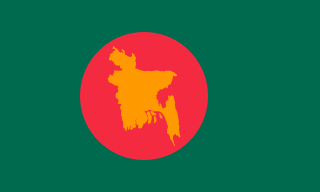
The Provisional Government of Bangladesh, popularly known as the Mujibnagar Government; also known as the Bangladeshi government-in-exile, was a provisional government that was established following the proclamation of independence of East Pakistan as Bangladesh on 10 April 1971. Headed by prime minister Tajuddin Ahmad, it was the supreme leadership of the Bangladeshi liberation movement, comprising a cabinet, a diplomatic corps, an assembly, an armed force, and a radio service. It operated as a government-in-exile from Kolkata.
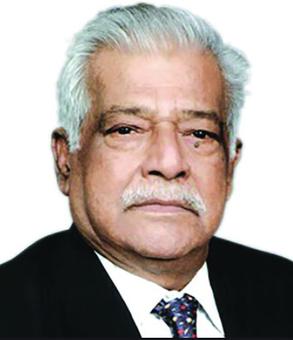
Khandakar Mohammad Obaidur Rahman was a Bangladeshi politician. He was a member of the Jatiya Sangsad in 1973 representing Bangladesh Awami League and in 1979, 1996 and 2001 representing the Bangladesh Nationalist Party (BNP).
The non-cooperation movement of 1971 was a historical movement in then East Pakistan by the Awami League and the general public against the military government of Pakistan in March of that year. After the announcement of the suspension of the session of the National Assembly of Pakistan on 1 March, the spontaneous movement of the people started, but officially on the call of Sheikh Mujibur Rahman, the non-cooperation movement started on 2 March and continued until 25 March. The movement lasted for a total of 25 days. The main objective of this movement was to ensure the autonomy of East Pakistan from the central government of Pakistan. During this period, the control of the central government of West Pakistan over the civilian administration of East Pakistan was almost non-existent. At one stage of the movement, the whole of East Pakistan, except the cantonments, was practically under the command of Sheikh Mujibur Rahman.
The Eleven Points Programme was a charter of demands in East Pakistan that called for reforms and the resignation of President Ayub Khan. It was led by students and was a successor to the six point movement led by Sheikh Mujibur Rahman.
Provincial elections were held in East Pakistan on 17 December 1970, ten days after general elections. A total of 1,850 candidates ran for the 300 seats in the East Pakistan Provincial Assembly. The result was a landslide victory for the Awami League, which won 288 of the 300 seats.
Md. Anisur Rahman is a Bangladeshi economist and intellectual, known for his significant contributions to the Bangladeshi independence movement. Along with Dr. Sadeque, Nurul Islam, Habibur Rahman, and Akhlaqur Rahman, Rahman was involved in developing the two-economy theory, which helped in providing a scientific understanding of the economic disparities between West Pakistan and East Pakistan. This understanding played a crucial role in fomenting nationalist aspirations of the people of Bangladesh and the development of the 6-Point Programme presented by Sheikh Mujibur Rahman to the West Pakistan government during the struggle for independence.
